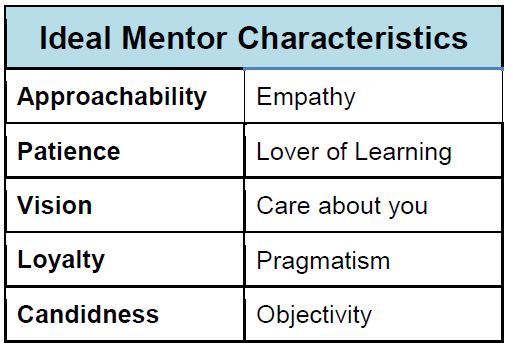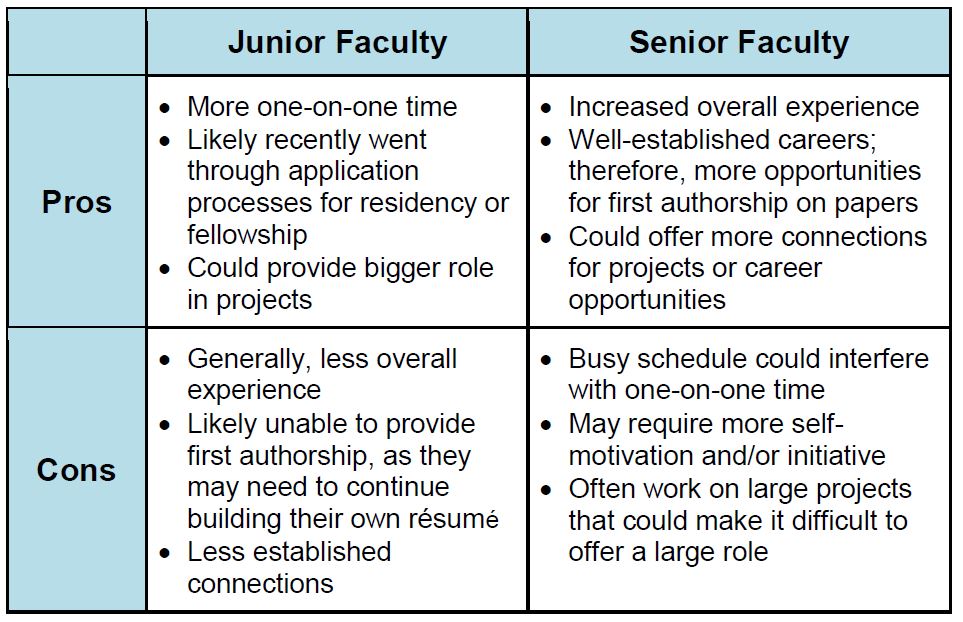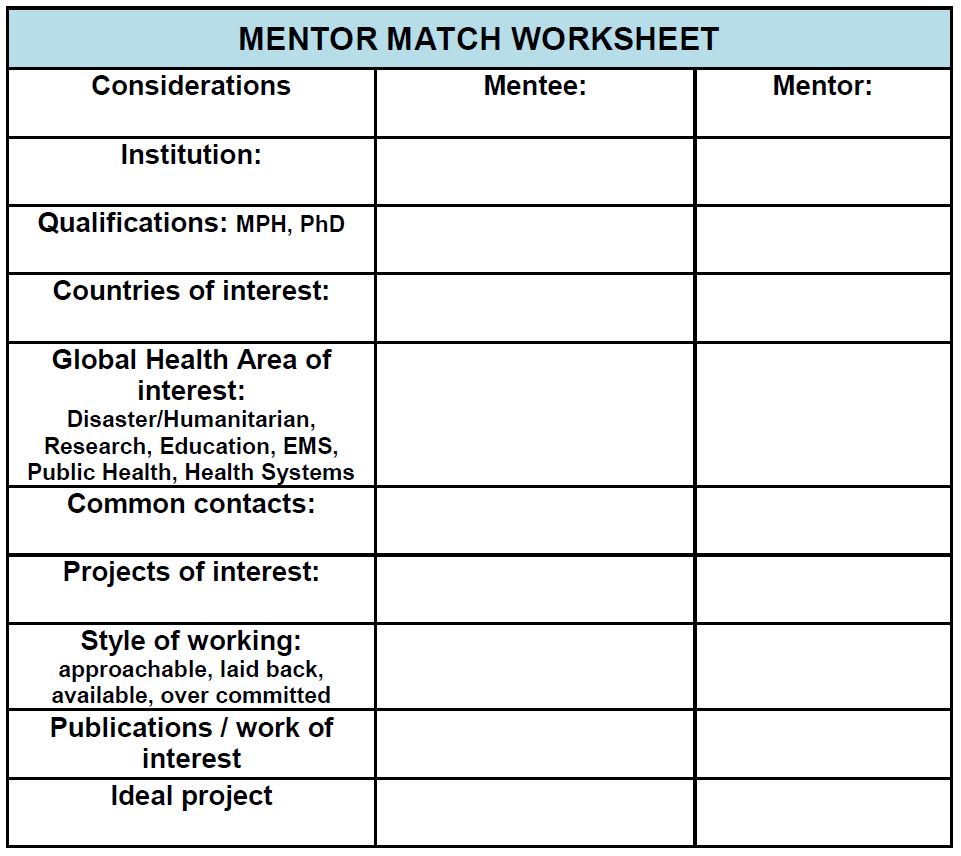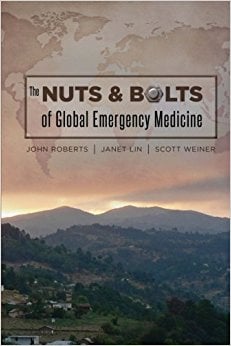Ch 8. Mentorship: How to Choose a Mentor
Introduction
This chapter focuses on the process of selecting a global emergency medicine mentor. Your selection process should be every bit as rigorous and well researched as your project and destination selection. When properly matched, a mentor can be far more than a stepping-stone on the path to your GEM career – a mentor can be a catapult.
Characteristics of an ideal mentor
An ideal mentor should be approachable, empathetic, patient, honest, lover of learning, and with the vision to see your potential.1 You should be sure that a mentor cares enough about your development to make you a priority in their busy schedule. They should be willing to help you set realistic goals and timelines to achieve them. By the same measure, they should be equally willing to tell you if your goals are unrealistic. You want someone who will give you honest, constructive feedback. Mentors should not encourage you to pursue every opportunity, but rather they should look at your ideas and actions objectively and give you honest feedback. The ideal mentor is someone you should be able to confide in, who you can share your fears and mistakes with, without fear of embarrassment or repercussions. Mentors should be loyal to their protégés; willing to stand up for you and ready to back you when the time comes to move on to residency, fellowship, or a career move.

Junior versus Senior Faculty
There is no universally correct answer to this question. This choice should be based on your personality and experience, as well as your chemistry with potential mentors. In fact, the latter may be the most important consideration. The table below may help you to make this decision by outlining the pros and cons of each.

You may find it advantageous to seek out multiple mentors, especially when just starting on your path to a GEM career. In this manner you will be able to take advantage of the pros of both junior and senior faculty – but beware! Spreading yourself too thin between projects will only work toward your detriment.
Finding a mentor
Depending on your institution, there may be a limited amount of possible mentors depending on how active it is internationally. Finding a mentor at your home institution offers the advantage of proximity, but it is not necessary. In fact, working with colleagues across great distances will become a part of your daily routine, so be prepared!
Specialty/Interest
Global emergency medicine is a diverse, rapidly expanding field with many distinct areas of concentration. The first question to ask of yourself is: Do I have a particular interest within GEM? Education? Disaster? Policy? If so, seek a mentor specializing in this area; do not assume faculty are well-versed in all areas of GEM by virtue of the fact that they are prolific in one. Also, individuals who have connections and experience in a particular country or region you are interested in will allow you to receive mentorship and guidance, along with access to existing projects.
National Organizations
Great places to start are national and international organizations. SAEM, AAEM, and ACEP all have a dedicated international section or committee. Explore the leadership of each of these divisions to get an idea of who is active in GEM and what they are doing. At national conferences there are meetings, conferences, and talks dedicated to every facet of international emergency medicine and global health. The leadership is always excited to meet the future of GEM, and it is okay to attend open meetings and conferences. There are also societies dedicated to most countries/regions, and many of them have some form of an annual meeting.
What is a mentor looking for in me?
Motivation
Mentors are looking for self-motivated individuals that will follow through with plans. You need not come to the table with a stepwise approach to solving the pre-hospital transport woes of Sub-Saharan Africa! An impassioned demeanor and a penchant for hard work are all that is expected.
Self-Awareness
It is important that you possess the self-awareness to understand what your particular motivations are for working in the global health sector, as well as the ability to articulate those motivations clearly. This question will come up repeatedly throughout all stages of your career and your answer to it may affect your future greatly. Be prepared for potential mentors to ask it.
Flexibility/Adaptability
It is also important to demonstrate your ability to work with (and occasionally, to lead) those across geographic and cultural gaps. If you already have this kind of experience, be sure to volunteer it during your initial conversations. If not, be sure to seize on these opportunities as they come, as they will build your mentor’s confidence in your potential.
Approaching potential mentors
Don’t be shy!
An introduction via a mutual colleague or friend is always a plus. Offer a handshake at a conference or drop a sincere email expressing interest in working together. Global emergency physicians are a small, tightly-knit community always looking to help usher in the new era of leaders.
Set yourself apart
Eminent figures within this community are approached frequently by eager students seeking mentorship, so how do you set yourself apart? First, ask questions about your specific interests during the initial encounter. Mentors are far more likely to respond to these than to generalized questions about the field. Second, make sure to talk about your background, consider offering them a copy of your CV to demonstrate your qualifications. Finally, be humble, it is easier to teach than to re-train and overselling yourself can be off putting.
Mentor Resources
AAEM
There are resources available from AAEM that can provide guidance in seeking and selecting a mentor or deciding on the characteristics you are looking for in a mentor; especially if your home institution doesn’t have an active international program.
Mentor matching
Mentor matching sites: Several mentor-matching resources are available through professional societies such as EMRA and SAEM that help interested residents and medical students find faculty willing to serve as mentors. Below are links that provide useful information
EMRA fellowship mentor site
EMRA Research Mentor Site
GEMA Mentor Site

References
- Melanson, M. Qualities of the Ideal Mentor. U.S. Army Medical Department Journal. Jul-Sep 2013; p47.





